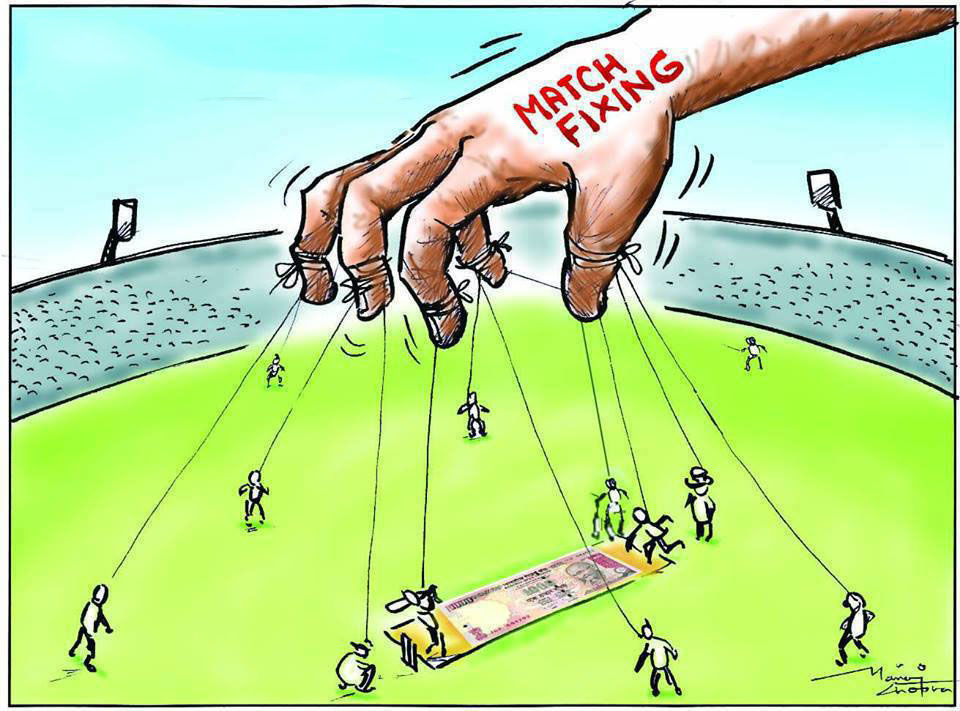Innocent until proven guilty or maybe until any law is reformed for such illegalities-
Match-fixing is not an independent offense in India and there are no laws covering it. After every match-fixing scandal, investigators, legislators, and lawyers have called for reforms, arguing that the absence of laws makes it difficult for them to incriminate someone for match-fixing. Well, it doesn't seem true but the story of Sreesanth says the same.
Story of a Big Fall:
The 2013 Indian Premier League spot-fixing and betting case arose when the Delhi Police arrested three cricketers, Sreesanth, Ajit Chandila, and Ankeet Chavan, on the charges of alleged spot-fixing.
From the information they released to the media, the Delhi Police had more than enough to keep him behind bars. They had a recording of a telephone call between Jiju Janardhanan, who Sreesanth admitted was a friend since he was 18, and Chandresh Patel, a bookie, known in gambling circles as CP. Janardhanan and Patel were heard discussing details of a spot-fix that involved Sreesanth conceding 14 runs in an over during an IPL game.
To prove the fix was on, Sreesanth was to do some stretching at the top of his mark and then hang a towel out of his trousers. There was also hotel security footage of a friend of Sreesanth's, Abhishek Shukla, going to Sreesanth's hotel room in Mumbai and fetching Rs 5.5 lakhs and some mobile phones. The police also had a recording of a call where Sreesanth asks Janardhanan if he will still get the money, though the over went for 13 runs, not 14. And they had a tearful Sreesanth confession.
And yes the game was not over!
But police had a problem, because, as betting is not legal in India in the first place, there is no law specifically for match-fixing. The police had no choice but to charge Sreesanth, fellow players Ankit Chavan and Ajit Chandila, and 38 people in total, with a conspiracy to launder money. (Even after so many sections, laws not even a single for this.)
Who knows what the truth is?
Banned cricketer S Sreesanth, who was arrested in connection with the 2013 spot-fixing scandal, in 2019 claimed in the Supreme Court that he had made the confession about his involvement in the alleged crime as Delhi Police had threatened that his family members would be implicated and tortured.
(Should public believe him, who cares!)
The question is why isn't any law made? Why cricketer like Sreesanth was easily discharged from this case?
(To all his fans- Now he can play IPL matches as his ban has come to an end on 18th September 2020)
In the UK there is the Gambling Act of 2005, which was used in the criminal trials against Mohammad Amir, Mohammad Asif, and Salman Butt when they spot-fixed in 2010.
It isn't that no bills were introduced for this.
In 2013, the Sports Ministry drafted the Prevention of Sporting Fraud Bill, which suggested a jail term for offenders. That Bill has died a slow death.
Two Private Member’s Bills too were introduced in the Lok Sabha, one by Anurag Thakur (National Sports Ethics Commission Bill) in 2016 and the other by Shashi Tharoor — The Sports (Online Gaming and Prevention of Fraud) Bill – in 2018. Neither has been debated yet.
(Unless such an issue trend on social media, how will it be taken into consideration?)
There has been a fall in the number of scams in cricket owing to the strict laws and harsh punishments. Whether it is IPL or international cricket, one act could cause one hundred regrets. It takes one wrong decision to ruin all hard work, efforts, and reputation.
But can super overs be fixed?
Cause the most thrilling part of IPL 2020 was the 2 super overs between MI and KXIP, wasn't it?




Precise and concise 💯
ReplyDeleteWaaaaaaaaao
ReplyDeleteReally nice
ReplyDelete